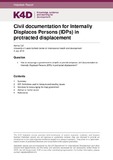| dc.contributor.author | Tull, Kerina | |
| dc.coverage.spatial | Iraq | en |
| dc.date.accessioned | 2019-08-05T13:17:04Z | |
| dc.date.available | 2019-08-05T13:17:04Z | |
| dc.date.issued | 2019-07-05 | |
| dc.identifier.citation | Tull, K. (2019). Civil Documentation for Internally Displaced Persons (IDPs) in Protracted Displacement. K4D Helpdesk Report 636. Brighton, UK: Institute of Development Studies. | en |
| dc.identifier.uri | https://opendocs.ids.ac.uk/opendocs/handle/20.500.12413/14626 | |
| dc.description.abstract | This rapid review examines evidence on how the Iraqi government can simplify or provide temporary civil documentation to IDPs in protracted displacement. Conflict and violence are the main triggers of internal displacement; therefore, information is provided on such countries with protracted displacement. Practical solutions used effectively by them is also included. If national governments are unable or unwilling to meet their responsibilities, the international community has a role to play in promoting and reinforcing efforts to ensure protection, assistance and solutions for IDPs (OCHA, 2018). Therefore, most of the literature available is focused towards the needs of the IDPs, as well as the assistance provided by these agencies, e.g. the United Nations (UN). Evidence is mainly for both refugees and IDPs – in some cases the terms are used inter-changeably. In order to simplify the documentation process, advances in digital technology are resulting in new approaches, e.g. introduction of centrally-based identity systems by governments around the world (Oakeshott et al., 2018; Mills, 2019; UNHCR, 2019). As this review is focusing on Iraq, the government could also accept testimonies of mukhtars (local mayors), recommending citizens and affirming their place of residence, as "an acceptable official document" (al-Taie, 2017b) as a temporary solution to security clearance. This could prevent potential problems due to movement from place of origin (LandInfo, 2018). Multi-country evidence proves that updating policies with inclusivity is a necessary but complex and longer-term process (Saieh et al., 2019): disability and gender-based discrimination in existing Iraqi laws and practices regarding civil registration, as well as the provision of nationality legal documentation, need to be addressed. However, no evidence was found to see if this is currently the case. Likewise, data allowing use of expired documentation will also need further investigation. | en |
| dc.language.iso | en | en |
| dc.publisher | IDS | en |
| dc.relation.ispartofseries | K4D Helpdesk Report;636 | |
| dc.rights.uri | https://www.nationalarchives.gov.uk/doc/open-government-licence/version/3/ | en |
| dc.subject | Aid | en |
| dc.subject | Governance | en |
| dc.subject | Rights | en |
| dc.subject | Security and Conflict | en |
| dc.title | Civil Documentation for Internally Displaces Persons (IDPs) in Protracted Displacement | en |
| dc.type | Helpdesk | en |
| dc.rights.holder | © DFID - Crown copyright 2019 | en |
| dcterms.dateAccepted | 2019-07-05 | |
| rioxxterms.funder | Department for International Development, UK Government | en |
| rioxxterms.identifier.project | K4D | en |
| rioxxterms.version | VoR | en |
| rioxxterms.funder.project | 238a9fa4-fe4a-4380-996b-995f33607ba0 | en |

